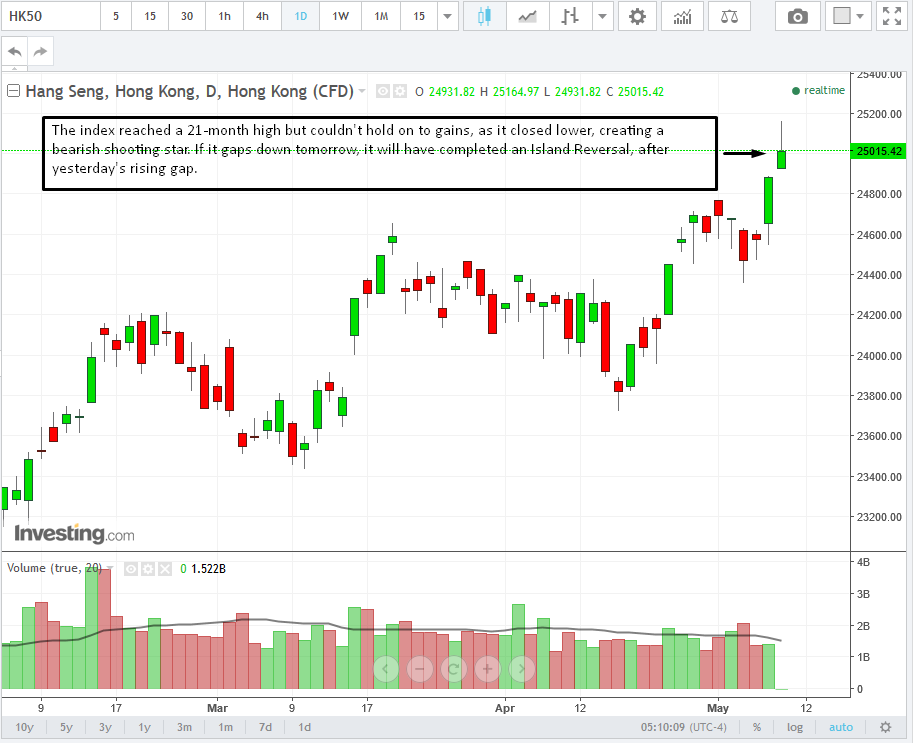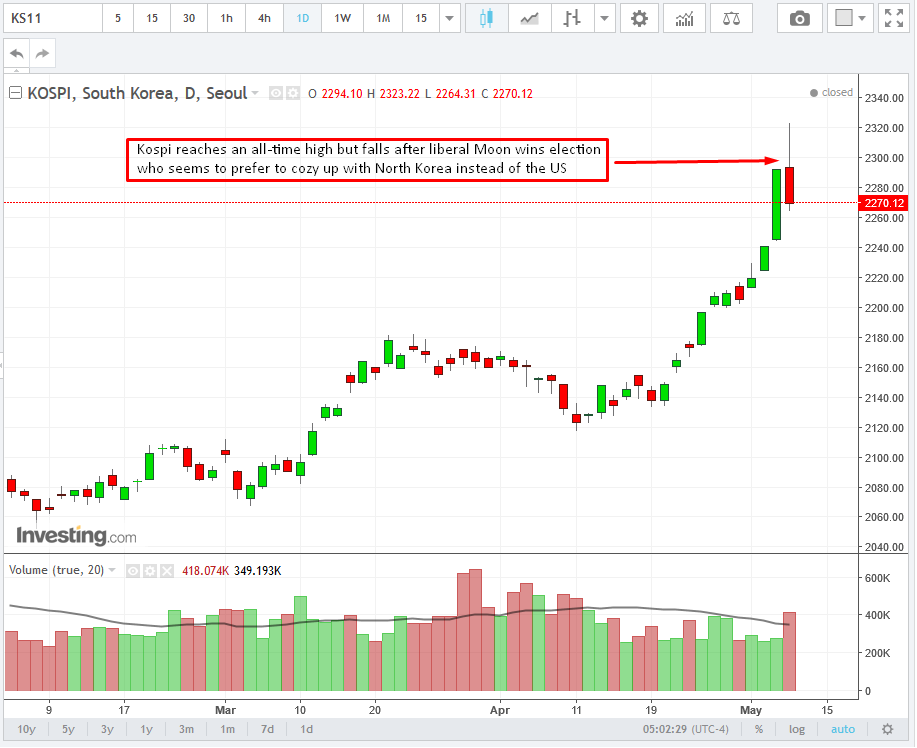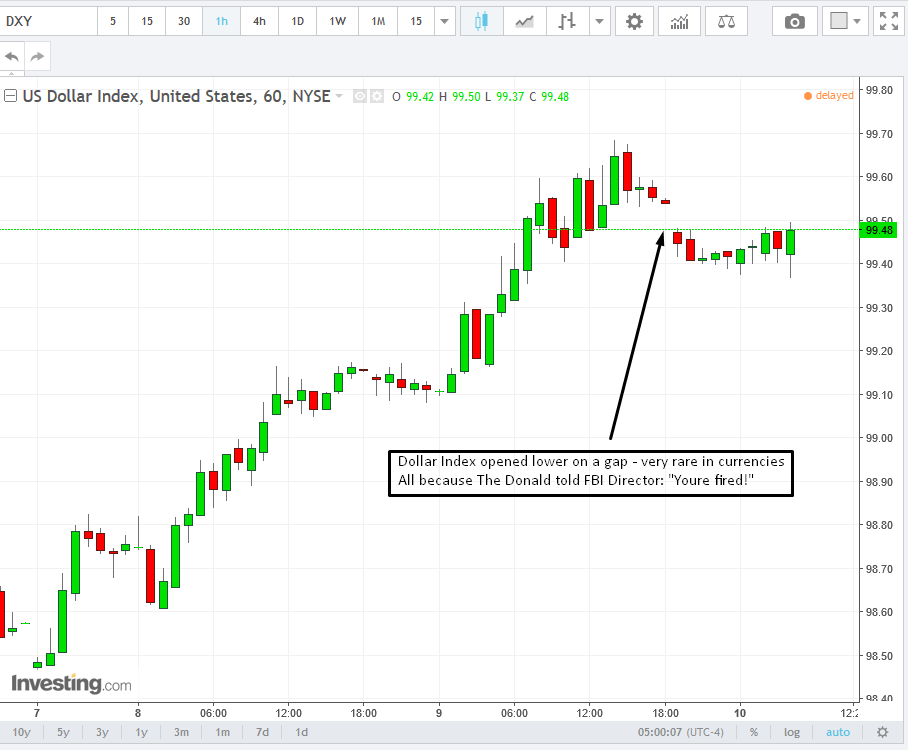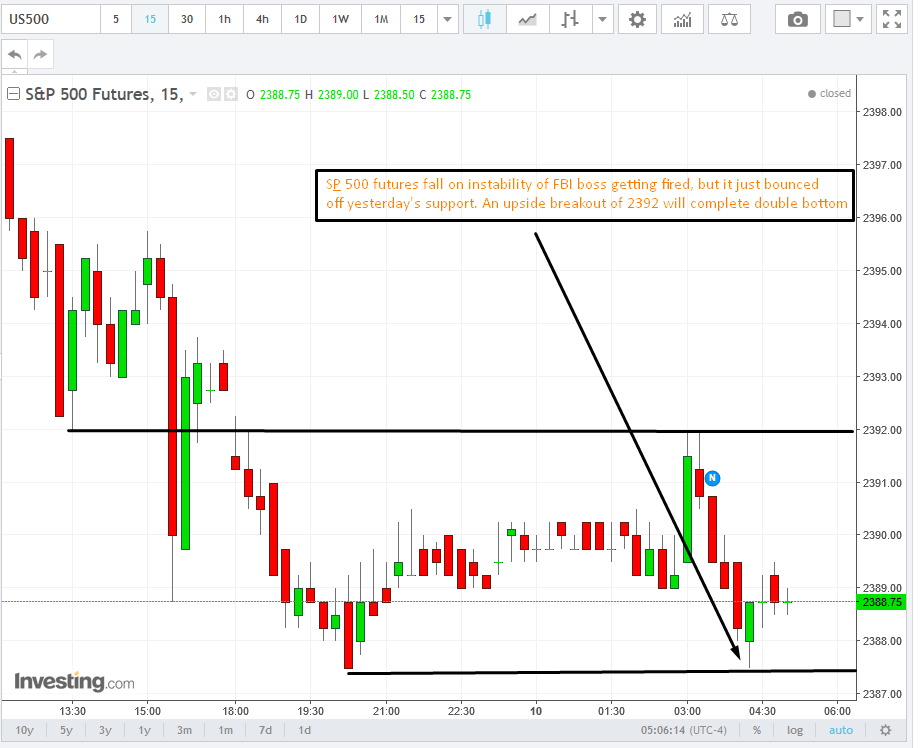by Pinchas Cohen
Asian equities resumed their rally, with Hong Kong’s Hang Seng catapulting to a 21-month high. S&P 500 futures, however, edged down as investors reacted unfavorably to President Trump's firing of FBI Director James Comey and the implications the sudden dismissal will have on the much-watched investigation into possible Russian ties to the Trump campaign and administration. The yen gained as a safe haven from North Korea’s nuclear threats.
After falling for a month on instability as government regulators cleaned house, the Shanghai exchange found something to be positive about, grabbing the coattails of its sister equity market across the border.

Ironically, investors drove up Hong Kong’s Hang Seng simply because of perceived stabilization on the mainland. However, the positivity was tenuous; Chinese shares have now turned lower.

South Korean shares fell from an all-time high after liberal candidate Moon Jae-in was elected president. Moon has been advocating for a closer relationship with North Korea, at the expense of his country's relationship with the US. After hitting today's high, however, the KOSPI sold off, taking back half of yesterday’s gains.
Japan's Nikkei 225 closed at 19,900.09, edging toward the all-important psychological level of 20,000, ahead of earnings releases by some of Japan’s biggest corporations.

After hawkish Fedspeak drove up the dollar to its highest levels in a month yesterday, the firing of the FBI director sent nervous investors on a USD selling spree, favoring the yen. The sell-off created a rare 0.11 percent falling gap in today’s Dollar Index opening price. After reaching a low of 99.375, the dollar bounced back, now at 99.463.
Since the financial crisis, which was followed by a European Union crisis, followed by the more current rise in anti-globalization sentiment—all taking place against a negative interest rate backdrop—a renewed faith in the world economy appears to have resurfaced recently, diminishing volatility in global stock and bond markets.
Still, equity valuations are at record highs. Nevertheless, without rising earnings, investors are not likely to prop up higher prices.
Equities
- The Hang Seng advanced 0.51%, to 25015.42, its highest level since July 2015.
- Japan’s TOPIX gained 0.23% to 1585.19, the Nikkei 225 gained 0.3%. The market narrative for Japan's indices is that low valuations and under-performance relative to the US market should allow for further gains.
- South Korea’s KOSPI fell 1 percent to 2270.12, after jumping 2.3 percent on Monday, the most since September 2015, after reaching a new all-time high.
- The Stoxx Europe 600 was lower by 0.22% to 394.95, after advancing 0.5 percent on Tuesday to its highest level since August 2015.

S&P 500 futures were lower by 0.22 percent to 2388.00. Yesterday it dropped 0.1 percent, as the CBOE Volatility Index rose, just one day after closing at the lowest its been since December 1993, its second lowest point ever since the gauge was conceived in 1990.
Currencies
- The Dollar Index opened with a 0.11 percent falling gap and scraped up to 99.476. There's been very little volatility among the FX majors since.
- The pound is up 0.23 to 1.2964%
- The euro is up 0.04 percent at 1.0879
- The South Korean won fell 0.4 percent. The yen slipped 0.1 percent to 114.08 per dollar, dropping for a ninth day in 10.
- The Bloomberg Dollar Spot Index lost 0.2 percent after climbing 0.4 percent Tuesday.
Bonds
- The yield on 10-year Treasury notes fell one basis point to 2.39 percent. Australian 10-year yields dropped three basis points to 2.66 percent.
Commodities
- Gold was flat at $1,221.60 an ounce. The metal has dropped during the previous five sessions.
- Oil climbed 0.7 percent to $46.20 a barrel, resuming gains after falling 1.2 percent on Tuesday. The move was spurred by industry data showing U.S. crude stockpiles declined.
